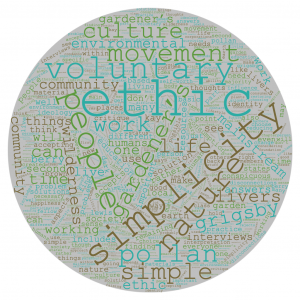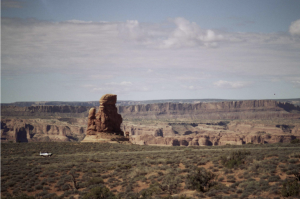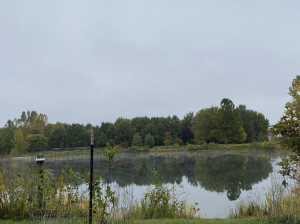27 The Gardener’s Ethic: Countering Alienation from Nature
Chloe Donovan

Hi, my name is Chloe. My chapter explores the themes in Michael Pollan’s Second Nature: A Gardener’s Education…read more.

In my first reading of Second Nature: A Gardener’s Education, Michael Pollan challenged the environmental ethic that I have unconsciously held for as long as I can remember.
His chapter, “Nature Abhors a Garden,” particularly sparked this evaluation. In this chapter, Pollan states that, “gardening quickly teaches you to distrust…absolutes, to frame the question a little differently”(p. 49). To me, the broader absolute Pollan challenges is that many Americans have grown up with a ‘wilderness ethic’ but do not know exactly how they came to hold it, or the implications that come along with it.
Framing the question differently involves assessing your own beliefs, as well as how you came to hold them. The wilderness ethic is one such ideology that I had to (and continue to) ponder in my own life. This ethic idolizes perfectly preserved nature, raising it up to sacred status. Humans thoroughly use and degrade the rest of the land that does not meet this status. Pollan sums up this disconnect by stating that, “once a landscape is no longer ‘virgin’ it is typically written off as fallen, lost to nature, irredeemable” (p. 188). The wilderness ethic condemns humans for using land and resources, something that is necessary for even our basic survival needs. Raising one part of nature up for salvation while destroying the rest is not a realistic or sustainable practice. I have had thoughts aligning with the wilderness ethic. I did not take into account that we have to consume and use resources to survive, as basic as that seems. We are always going to pollute in some way, and consume in some way. Sectioning off certain natural areas in the name of preservation is one of the most human things we could do, even creating the concept of wilderness, all while not recognizing our humanness in this very action.
Pollan asserts that this could not be the final end-all answer. Nature created humans, humans created culture, thus our culture is our participation in nature. The answer for the problem we have with wilderness is culture. We must develop a sustainable way of thinking that accepts that our survival depends on utilizing the resources available to us. “For though we may be the Earth’s gardener’s, we are also its weeds. And we won’t get anywhere until we come to terms with this crucial ambiguity about our role-that we are at once the problem and the only possible solution to the problem” (Pollan, 1991, p. 115).
In place of the wilderness ethic, Pollan (1991) recommends the gardener’s ethic, an integrated approach which accepts changing the environment as a part of human nature. The gardener’s ethic is anthropocentric, which includes accepting that we have choices, morality, and values. This ethic accepts the struggle between nature and culture (Pollan, 1991, p. 193). It also includes the idea of local answers, or proposing “different solutions in different places and times.” There is an emphasis placed on accepting that there are distinctions between varying degrees of human intervention in nature. The combination of these principles culminates with Pollan’s main thought about the gardener’s ethic. The garden (nature) provides the materials to find solutions to the problems you may face.

Not everyone readily accepts all tenets of this approach, however. In “The Importance of an Environmental Ethic that Fits”, David Kay examines the gardener’s ethic and its arguments. While he is inclined to agree with the majority of Pollan’s base points about the issues that come with the wilderness ethic, he struggles to see the gardener’s ethic as a pragmatic and universal solution. The main complication that Kay addresses is that one comprehensive environmental ethic will isolate groups of people who do not fit into what the gardener’s ethic prescribes. He states that, “rather than searching for a blanket ethic that will speak to the entire population, environmentalists ought to address people from the perspective to which they feel most connected” (Kay, 2015, p. 1). I think there is truth to his perspective, there isn’t an environmental ethic that fits everyone’s views on the issue. But does there need to be? Here is where I think Kay misses a key point in Pollan’s work. Pollan is not making the case for one specific environmental ethic, rather that a gardener’s ethic is a possible solution to the problems a wilderness ethic poses.
Kay focuses on the small spatial scale that Pollan uses to flesh out his theory. While this is a relevant point, a major tenet of the gardener’s ethic is that it is adaptable to different people and different situations. Pollan touches on Kay’s critique of the gardener’s ethic. He discusses how the idea of local answers has a weakness, that it will, “never speak as clearly or univocally as the wilderness ethic” (Pollan, 1991, p. 190). However, local answers are a start to solving the problem of blanket environmental solutions for places in the United States that are vastly different. It is an important point to make that finding different solutions to different problems is a more difficult and strenuous process. While it requires more time and thought, finding local answers is ultimately best for the sustainability and longevity of a place. It is important to consider each person’s conception of their needs and self-interests, which are influenced by upbringing, socialization, and past life decisions. A gardener’s ethic could be used to find answers to many problems, but is ultimately not framed as a universal solution that works in every situation for every person.¹
Second Nature: A Gardener’s Education helped me to flesh out some thoughts I had already been having about the wilderness ethic, even if I hadn’t had that exact name for it yet. It also created some questions about how this affects people’s lives today. I am certainly not the only person to have thought about this, Pollan’s book was published in 1991 and is far from the only piece written about this subject (footnote to “The Trouble with Wilderness; or, Getting Back to Wrong Nature” by William Cronan for another take on this). Do people live a gardener’s ethic? How would they do so? These questions led me to the voluntary simplicity movement.
People in the voluntary simplicity movement, otherwise known as simple livers, “are concerned with environmental degradation, critical of conspicuous consumption…and [are] dissatisfied by the quality of life afforded by full participation in mass consumer society.” (Grisby, 2004, p. 1) A main principle of the voluntary simplicity movement is the acknowledgement that more stuff does not bring you more happiness. Simple livers prefer to determine what the right level of ‘stuff’ is for themselves, rather than have someone else dictate that for them, and try to influence them to consume more. In a sense, this movement follows the gardener’s ethic as it accepts that humans participate in unsustainable culture and that we have to change the culture in order to survive.
Mary Grisby, author of Buying Time and Getting By, interviews people who choose to live a voluntarily simplistic lifestyle. Grisby’s writing style includes descriptions of each person she interviews. I think that this stylistic choice humanizes her subjects. Oftentimes, while reading interviews, it is difficult for me to picture the person if I have no prior knowledge of what they look like and how they act. I am choosing to include her descriptions of the simple livers to keep the integrity and intentions of her writing clear. Kevin, a kindly grey-bearded man in his seventies, explains how voluntary simplicity manifests in his life. “Well, the basic purpose [of voluntary simplicity] is to live more simply, live closer to the earth, and live simply enough so it takes very little to actually earn where you are so you can spend your time doing things you like to do rather than things that become the mandates that you do…my security was not in my wallet, my security was in my head” (Grisby, 2004, p. 2). He goes on to describe how he didn’t have any money, just his bike, and to him that was enough. Kevin had to construct a moral identity for himself that aligned with his thoughts on how he should live, rather than what the current consumer society dictates for a person’s life. “Identity work is necessary when people discover that old meanings don’t suit their new circumstances” (Grisby, 2004, p. 56). This is a vital part of how people find the voluntary simplicity movement, and how joining a community of like-minded people can also have an effect on how one constructs this ‘new identity’.
Another simple liver that Grisby interviews is Lewis. Lewis has closely cropped dark brown hair and dark brown eyes, and an excited expression that shows how passionate he is about the subject matter. “By reducing our need for material things through conscious decisions—that is what is going to help us do that (build the foundation for a simple living lifestyle). But in general I think it is about reducing personal resource requirements as far as material possessions so you have time for yourself and hopefully time for others. I see simplicity benefiting the individual and society itself. Right now most people in our lives are so wrapped up in being so busy without any end in sight” (Grisby, 2004, p. 5). Lewis is setting up the foundation of simplicity, while planning on taking it even further in the future. His journey focuses on reducing how much influence material things have on his self-worth. He realizes that in the consumerist society we live in today, material things can influence how we measure our self-worth. He rejects this, and instead values time, for himself and for others. He shares this value with his wife, Barbara. Barbara has similar dark brown eyes and straight dark brown hair. She expands on her husband’s thoughts, saying, “so for us it may be when we say “simplicity,” we don’t know exactly what the future will hold. It may evolve” (Grisby, 2004, p. 5). Lewis and Barbara’s use of voluntary simplicity exhibits living an aspect of a gardener’s ethic, how they are remaining attached to the mainstream culture but altering it to fit their needs and wants.
One of the most important aspects of the voluntary simplicity movement is that for even the dozen or so interviews of simple livers that I read, none of them perfectly fit a mold. Everyone has a different interpretation of what this ideology means to them. And that is accepted and encouraged within the movement:
“Unlike some alternative movements which advocate withdrawing from or rejecting the mainstream, the voluntary simplicity movement advocates remaining in contact with the mainstream in some ways, such as through volunteer work, property ownership, investment, and buying goods and services from locally owned businesses. But other aspects of the mainstream, such as conspicuous consumption and seeking status and meaning through waged work, are rejected” (Grisby, 2004, p. 6).
How a person rejects these concepts is entirely up to them. The importance of remaining in the mainstream and continuing to add to our culture is what links the voluntary simplicity movement so strongly to a gardener’s ethic. For some, voluntary simplicity is taken very literally, cutting out a lot of waste and unnecessary objects. For others, it is more of a personal goal to avoid living a stagnant life. This reinforces how applicable the gardener’s ethic is to a non-homogenous culture. Finding local answers is paramount to both the voluntary simplicity movement and holding a gardener’s ethic.
In David Kay’s perspective of Second Nature: A Gardener’s Education, he makes the point that the “debate (over a functioning environmental ethic) will continue to gain more and more nuance, yet remain in the ivory tower and inaccessible to that majority of Americans. Simply put, there is no single environmental ethic that will speak to the majority of the population. Instead, we need to start targeting specific ethics towards specific communities.” (Kay, 2015, p. 1) This is where voluntary simplicity comes in; those who choose to prescribe to this ideology can tailor fit their interpretation of its tenets to their own needs.
There are some issues to be noted about the constituency of voluntary simplicity. It is not a movement that is readily available to everyone. According to Mary Grisby most members are white, middle-class, heterosexual, and would describe themselves as well-educated. This does not mean that voluntary simplicity does not have the ability to become more accessible, it just means there is some work to be done to remedy this lack of accessibility. Acknowledging the role that race, power, and injustice has in a community can allow for healthy and constructive engagement between members (Holley, 2016, p. 33). Within the simple living community, this acknowledgement is not standard practice. “One reason simple livers don’t make class inequality in the United States salient in their world view is that they don’t use class to think about their own life experiences, which they draw on to construct ideology” (Grisby, 2004, p. 135).
While simple livers do not support self-worth based on conspicuous consumption, they are committed to remaining in contact with the mainstream. Class is a substantial part of our mainstream, and still exists for members of the voluntary simplicity movement. “The high educational levels and histories of income and occupational mobility of many simple livers make them less sensitive to structural barriers” (Grisby, 2004, p. 135). An important qualification to point out about the voluntary simplicity movement is that it is a choice for people who are surviving. Unhappiness resulting from overconsumption is a reason why many choose to join the movement. Someone who is barely surviving is not over-consuming. Voluntary simplicity is just as it sounds, leading a voluntarily simple life choosing to not partake in conspicuous consumption, which is made possible by having resources to make that choice. Regardless of who you are, identity should not be found exclusively through overconsumption. This can be unhealthy for people from all walks of life.
A common critique of the movement is that simple livers do not want to do work, as it is often the case they cut down hours working in exchange for time gained. However, it seems to be the quality of the work that becomes an issue for simple livers. “The basic idea is to practice what we preach, to find out what you think, and to make all of your decisions based on that. To take a job that you really believe is doing the right thing. To the best of your ability, to cut down on your driving and your consumption, if you don’t fully believe in these things” (Grisby, 2004, p. 6), says Brad, an overall-clad man with a direct gaze and comfortable presence. Wendell Berry delves deeper into this concept in The Body and the Earth. He theorizes that modern society is based on many disconnections that happen between different points of community such as, “body and soul, husband and wife, marriage and community, [and/or] community and the earth” (Berry, 1994, p. 16). At each of these disconnections, governmental entities and corporations set up enterprises that create profit-making opportunities. These opportunities result in positive feedback loops that enhance unhappiness and consumerist desires within people. Berry emphasizes that the current economy is based upon the exploitation of these disconnections. The solution postulated by Berry includes restoring these connections through a common and attainable method. This statement sums up his position thoroughly:
“We are working well when we use ourselves as the fellow creatures of the plants, animals, materials, and other people we are working with. Such work is unifying, healing. It brings us home from pride and from despair, and places us responsibly within the human estate. It defines us as we are: not too good to work with our bodies, but too good to work poorly or joylessly or selfishly or alone” (Berry, 1994, p. 16).
Working with the body, other people, and materials gives people a real sense of accomplishment when you get to see what you physically created using your talents. A strong sense of community is fostered when people physically work together. Going back to nature and culture is paramount in practicing a gardener’s ethic, and this can be accomplished by doing good work. Working with what you have, and believing in what you are working for is something that Pollan stresses in Second Nature: A Gardener’s Education. Restoring the sense of meaningful work can help people realize that they do not need corporations and government to bridge the societal disconnects that Berry (1994) discusses.
I worked as a horticulture apprentice with a small team of fellow students to cultivate plants and restore land, I witnessed these sentiments everyday in my work. Though I do not see my fellow workers outside of this specific environment, I feel like I know each of them well. Communication flows easily and everyone is eager to do tasks and do them well. This is my first position like this, where I have felt that people truly care about the fate of the space and the community. In my experience, when working in a corporate environment it is easy to lose sight of what the actual goals are. If those goals are turning a profit at the expense of people’s health and happiness, it is near impossible to maintain the amount of care I see in my job today.

Through multiple readings of Second Nature: A Gardener’s Education, I got a more thorough processing of the thoughts posed by Pollan. Each read-through, even of individual sections, brings a new concept to light. This time, I was left considering what a gardener’s ethic would mean when applied to ‘real life’. It is okay, and in fact very necessary, to change the Earth to live. It sounds foolish to have to accept that, but a lot of the language used today condemns humans for daring to do this. In accepting this it is important to remember that while we do change the Earth and use its resources, there are ways to lessen extreme degradation. A gardener’s ethic can cure us of the alienation from nature and culture that is currently occurring. There are many ways to carry out a gardener’s ethic, often in places other than just the garden. In my own life, this has translated into considering voluntary simplicity. Voluntary simplicity is anthropocentric in nature, and includes accepting or rejecting aspects of mainstream culture. This depends on what feels fulfilling and ‘good’. This is a way to carry out aspects of a gardener’s ethic in practice. Reading Mary Grisby’s interviews of simple livers has shown me that mindless consumptive culture probably does not belong in anyone’s journey to finding happiness. After a decade-long break from weeding and watering, Pollan says, “eventually, though, I came back to the garden, which is probably how it usually goes” (Pollan, 1991, p. 33). I feel as if I’m coming back to my own garden with a new perspective and outlook on life.
References
Berry, W. (1994). The body and the earth. Psychoanalytic Review.
Grigsby, M. (2004). Buying Time and Getting By. State University of New York Press.
Holley, K. (2016). The Principles for Equitable and Inclusive Civic Engagement. Kirwan Institute.
Kay, D. (2015) The Importance of an Environmental Ethic that Fits. Unearthed Online Literary Journal. https://unearthedesf.com/hello-world/
Pollan, M. (1991). Second Nature. Atlantic Monthly Press.
